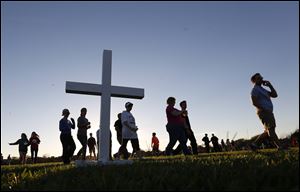
Enforce the law
2/22/2018
A number of recent mass shootings could have been prevented if current laws and procedures had been properly enforced.
The revelation that the FBI failed to properly investigate a tip that could have prevented the recent school shooting in Parkland, Fla., is all too familiar.
In the aftermath of the November, 2017, killing of 26 people in Sutherland Springs, Texas, we learned that the perpetrator should not have been allowed to purchase firearms due to a domestic violence court-martial conviction from his time with the Air Force.
Click here to view more Blade editorials | Check out the Behind The Editorial series
The shooter, Devin Kelley, purchased four firearms in stores in Texas and Colorado. He falsified documents at the time of purchase, claiming he had no prior criminal history. The FBI National Instant Criminal Background Check System (NICS) should have identified Kelley’s criminal history. Instead, Kelley passed the background checks, acquired his guns, and carried out the deadliest shooting in a place of worship in American history.
It turned out that the Air Force had failed to enter information about Kelley’s conviction into the FBI’s database. Had procedure been followed, Kelley would have been denied the firearms and 26 lives would have been spared.
Similarly, Dylann Roof’s murder of nine people at the Emanuel African Methodist Episcopal Church in Charleston, S.C., could have been prevented had existing protocols been followed.
Roof had previously been arrested for possessing a controlled substance, a charge which should have prohibited him from being able to purchase a firearm. The system failed.
Then-FBI Director James Comey was forced to admit that Roof “was able to purchase the gun used in the attack only because of lapses in the FBI’s background check system.”
Nikolas Cruz, the gunman in the Parkland shooting, was never arrested or convicted of a crime. However, a detailed tip was provided to the FBI 40 days before the shooting occured. The tipster provided information about Cruz’s erratic behavior, his gun ownership, and his threats to carry out a school shooting. The FBI failed to deliver this information to its Miami office, which would have investigated the tip and likely could have saved lives.
There is no question that additional gun laws and regulations must be considered in the coming weeks and months as the United States continues to grapple with mass shootings. And there is also no question that not every potential killer could be stopped by the faithful and competent execution of current law. Stephen Paddock, the Las Vegas shooter, never raised any red flags before his killing spree, for example.
But a good place to start would be for U.S. law enforcement to begin to do its utmost to enforce the law — to its full measure.
Follow @BladeOpinion on Twitter.